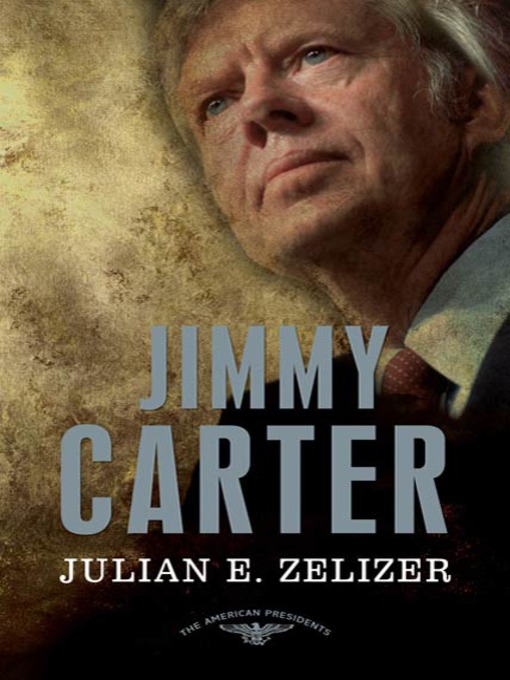
Jimmy Carter
The American Presidents
کتاب های مرتبط
- اطلاعات
- نقد و بررسی
- دیدگاه کاربران
نقد و بررسی

June 21, 2010
This slim biography portrays a president (1977-81) with more idealism than his predecessors but less luck and political skill. In a nation still reeling from Watergate, Carter's 1976 campaign stressing freedom from Washington politics propelled him to the presidency. Princeton history professor Zelizer (Arsenal of Democracy) regretfully points out that outsider status may win elections but exercising power requires traditional insider arm-twisting which Carter was slow to learn. His successes including the SALT II arms treaty, the Egyptian-Israeli Camp David peace accords, and a Social Security tax increase (denounced by conservatives but a lifesaver for the program). Zelizer feels Carter's hardest fought victory, passage of the Panama Canal treaty, damaged him by energizing his enemies without increasing his popularity because few Americans cared. They cared about inflation and unemployment, and Carter managed to anger both liberals and conservatives by rejecting both expensive social programs and massive tax cuts. Few blame him for Iran's revolution or the hostage-taking at the American embassy, but no presidential reputation could survive their long captivity or the bungled rescue attempt. And in this latest addition to the Am erican Presidents series, Zelizer concurs with other historians' lukewarm opinion of Carter but adds that many problems were beyond his control.

June 15, 2010
Zelizer (History and Public Affairs/Princeton Univ.; Arsenal of Democracy: The Politics of National Security—From World War II to the War on Terrorism, 2009, etc.) insightfully examines the 39th president.
Jimmy Carter's presidency, from 1977 to 1981, is often portrayed by historians as a failure. In this brief biography, the author acknowledges Carter's shortcomings as president, but he points out the largely forgotten fact that he was enormously popular during his first year in office. With the Watergate scandal still fresh, the American people were looking for a change, an anti-Nixon; in many ways, Carter fit the bill perfectly. Carter's outsider status—he was a relatively young governor of Georgia, untainted by national politics—worked to his advantage, particularly during his presidential campaign. He was a moderate but idealistic Democrat who was uncomfortable with ideological labels, and was willing to take on the establishment to do what he thought was right. But some of these very same qualities worked against Carter when he took office. He often found it difficult to compromise and struggled to muster the support of his own fractious Democratic Party, let alone Republicans. At the same time, the seemingly intractable hostage crisis in Iran, soaring oil prices and the troubled economy would have presented huge challenges to any president. Zelizer points out that although his few major achievements in office were impressive—in particular, the brokering of a peace between Egypt and Israel and the creation of a comprehensive, conservation-based national energy policy—Carter's style of antiestablishment leadership simply didn't translate well to Washington, resulting in a chronic inability to get things done. But once he left office, his fearless determination to do the right thing led to his greatest successes: in particular, his founding of the Carter Center, an independent diplomatic institution that has successfully monitored elections around the world, and his charitable work building houses with Habitat for Humanity.
In just 150 pages, Zelizer manages to effectively analyze how Carter's personality has led him to both failure and success.
(COPYRIGHT (2010) KIRKUS REVIEWS/NIELSEN BUSINESS MEDIA, INC. ALL RIGHTS RESERVED.)

August 1, 2010
This latest volume in the Holt series of compact biographies of American presidents is written by a Princeton professor of history. When politicians, pundits, and even historians speak of a failed presidency, the Carter administration is often cited. The term may be simplistic, even unfair, yet this engaging survey indicates that it is a resonably accurate description of Carters single term. Zelizer pays sufficient attention to Carters youth, his rise through Georgia politics, and his postpresidential efforts at international mediation. But the most engrossing portion of the work deals with Carters successes (there were some) and failures as president. He campaigned and won as a political outsider; unfortunately, he was unable to learn that he couldnt govern as an outsider. He lacked the traditional ties to the core elements of the Democratic Party. When the Iran hostage crisis and the Soviet invasion of Afghanistan eroded his support among independent voters, he lacked a hard-core base to rally behind him. For general readers, this work offers a fine analysis of the man and his career.(Reprinted with permission of Booklist, copyright 2010, American Library Association.)

























دیدگاه کاربران